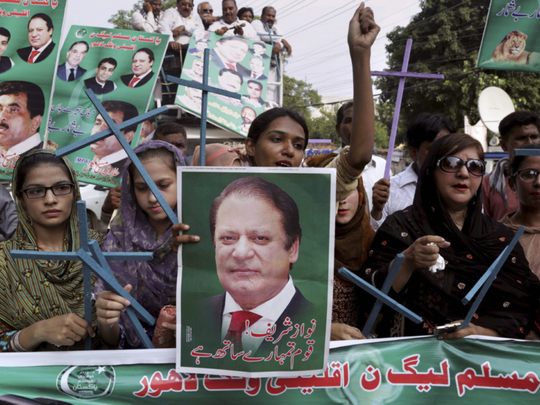
“For those hoping for signs of a deepening of democracy in Pakistan, the ouster of Nawaz Sharif provides no help,” said the New York Times. “On the surface, the decision of the Pakistani Supreme Court to disqualify Mr Sharif and his family from holding office over allegations of corruption seems a triumph for the rule of law, but the way it was done smacks too much of political infighting to celebrate, and the ensuing confusion is in no one’s interest... It is a sad commentary on the state of affairs in Pakistan that the best hope on all these fronts after Mr Sharif’s fall from power — remarkably, his third ouster — is that things don’t get worse. Civilian governments have always been hamstrung by the machinations of Pakistan’s security forces... Mr Sharif raised high hopes in 2013 when he assumed office in a peaceful transfer of power; a prime minister in Pakistan has yet to finish a full five-year term,” it said.
The paper hoped that the ouster would also create “opportunities for some change of course” and said: “Pakistan’s civilian leaders, for all their flaws, have at times tried to improve relations with India and to loosen the grip of the military, as Mr Sharif did. With national elections scheduled for 2018, his rise and fall should at least generate a national debate on how Pakistanis want to be ruled.”
The Guardian, true to its motto, focused on the global scale of the corruption allegation against Sharif and said: “Though this leaves Pakistan’s politics in turmoil, it is a very international affair. It was sparked by revelations in the Panama Papers concerning luxury London property, bought through British Virgin Islands companies linked to Mr Sharif’s children, who were minors at the time... The files proved, in eye-opening fashion, that members of the political elite have not played by the rules their citizens obey. The very wealthy realised long ago that they could maximise and conceal their wealth [and its origins] by exploiting the existence of multiple jurisdictions. [But] journalists have taken note... Equally strikingly, authorities have begun to band together to tackle tax evasion and corruption across borders — sometimes through simultaneous raids.”
The Dawn in Pakistan exhorted the nation to seize the opportunity for political and constitutional reforms. “Parliament is set to elect a new prime minister this week and another to replace the interim choice some two months from now,” the newspaper said in an editorial. “While that will bring some welcome temporary focus on parliamentary proceedings in an era where the institution has slipped into virtual irrelevance, reasserting the primacy of parliament in the democratic order will require a serious legislative agenda. The government and the opposition have a number of opportunities to work together, even in the polarised and bitter political climate in the country today. For one, the ouster of Nawaz Sharif has acted as a reminder that the Constitution, though significantly restored to its original democratic status by the 18th Amendment, has a number of distortions in it that ought to be removed... The next parliament should not have to operate under a cloud of uncertainty,” it said.
Commenting on the dramatic developments, the Daily Times said: “What we are witnessing in Pakistan today is nothing short of history in the making. And it is one that is tilting forcefully towards democracy’s embrace. At least this is what the opposition, including a former enemy combatant declared an absconder by the same court, would have us believe loud and clear... Far more befitting, they contend, to have the supremacy of the courts prevail than to leave a man in power to be little more than a macabre mascot of democratic tenure fulfilled. Indeed, Bilawal [Bhutto] is right to point out that the disqualification of a sitting prime minister by the courts — as opposed to those who elected him — poses no threat to the parliamentary system provided that the assembly completes its term. Which is the path upon which Pakistan is set to embark — for the second time in its 70-year history”





_resources1_16a31069e4e_small.jpg)





